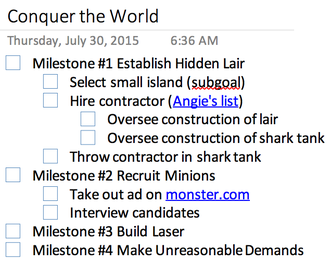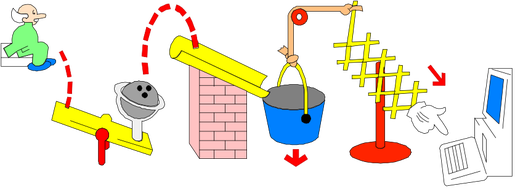
My last two articles discussed when you want your goals to be Specific and ways to ensure that goals are Measurable. In this article I am going to discuss the third concept in using the acronym SMART, making your goals Actionable. An alternate version of SMART uses the term achievable instead of actionable, but for reasons I will talk about next, I personally find actionable to be more useful.
Achievable I would be remiss to say that it is not good to at least consider the extent to which a goal is achievable. Research has shown that when it comes to goal setting, the most successful individuals are those more capable of accurately making self-assessments of their capabilities and resources available. Those individuals that fail to accurately gauge their abilities or resources are more likely to fail. This may make it seem then, that success is dependent upon setting goals that are achievable. However, there is also research on motivation that supports what Henry Ford was known to have said, “Whether you think you can, or you think you can’t—you’re right.” As it turns out, your individual beliefs regarding if you can or cannot achieve a goal has a significant impact on success, including if you are motivated to even begin working towards a goal in the first place. Individuals with beliefs that support high levels of success set stretch goals, goals that are challenging without the guarantee of achievement. Consider the laundry list of ludicrous, unachievable goals people at one point in time dared attempt. There was circumnavigating the earth in a wooden ship, running a mile in under 4 minutes, landing a man on the moon, me being chosen male model of the year, transplanting a human heart, cloning a sheep and the list continues. With recent advancements in technology it seems like the pace at which the once unachievable is being achieved is accelerating at an unprecedented rate. Maybe I am just watching too many YouTube videos. I admit my personal bias here. It is because of my firm belief in mankind’s ability to achieve the unachievable that I prefer using the term Actionable when structuring my SMART goals. It is within the context of what is actionable that I endeavor to use my decision making skills to accurately assess my abilities and the resources I have available. “Shoot for the moon. Even if you miss, you'll land among the stars.” - Norman Vincent Peale Actionable Instead of achievable, focus on what is actionable, what is your plan for success? For simple or short-term goals it may not take much effort to quickly write down the exact actions required. On the other hand, for complex or long-term goals the plan for success will most likely be more dynamic. Larger goals most often will require breaking them down into smaller sub-goals or establishing milestones. Personally, for my action plans I use Microsoft OneNote, but there are plenty of comparable options on the market you can choose from. The reason I prefer OneNote is because of the flexibility to create a custom format that works for you. In my case, being able to insert links and set up tasks as deep as I like are important features. The degree of detail you want in your action plan will vary. While creating a comprehensive action plan might seem ideal, regardless of the type of goal, when it comes to dynamic or long-term goals, you want to focus most of your effort on near term actions and leave the rest for later. The main reason for this approach is because by definition, dynamic goals ebb and flow, so you are better off not wasting time getting too specific with milestones that are distant. For instance, in my goal to conquer the world my energy is spent developing detail for my first two milestones, leaving the last two as general concepts. Until I have the hidden island, it is only important to know the island needs to be big enough to accommodate a laser. If then something goes wrong with my island plan and I have to switch to a luxury submarine, I benefit from having maintained efficiency and flexibility in the face of a dynamic environment. The Bottom Line Without action a goal is just a dream, therefore when structuring your SMART goals make sure the goal is actionable. To accomplish this, take the end goal and then set intermediate steps or milestones you need to accomplish along the way. After you have determined your milestones, focus on establishing next actions, those actions that will get you to the first milestone. As you progress, the actions you take will provide feedback that you can then use to adjust your plan. If you missed my articles on Specific and Measurable, follow the links. If you want to be notified next week, be sure to sign up for my free newsletter.
About the Author
Richard Feenstra is an educational psychologist and world renowned thumb wrestler. His focus is on judgment and decision making, including topics like cognitive dissonance and confirmation bias. He admires the work of Daniel Kahneman and highly recommends the book "Thinking Fast and Slow". Now that he has talked about himself in the third person and added some nice keywords for search engines, he hopes you enjoyed this blog and sends his best to friends, family, and his readers in their efforts to conquer the world.
4 Comments
Marge Carpo
9/20/2018 04:38:21 pm
This is my response to "Tell me my mistakes" exercise:
Reply
Chancy Fessler
4/9/2020 04:00:11 pm
I'm having trouble distinguishing between performance based goals (which are action based) and actionable "action items" or milestones.
Reply
4/10/2020 01:00:32 am
Hi Chancy,
Reply
Your comment will be posted after it is approved.
Leave a Reply. |
Authors
Richard Feenstra is an educational psychologist, with a focus on judgment and decision making.
(read more) 
Bobby Hoffman is the author of "Hack Your Motivation" and a professor of educational psychology at the University of Central Florida.
(read more) Archives
April 2023
Categories |


 RSS Feed
RSS Feed
